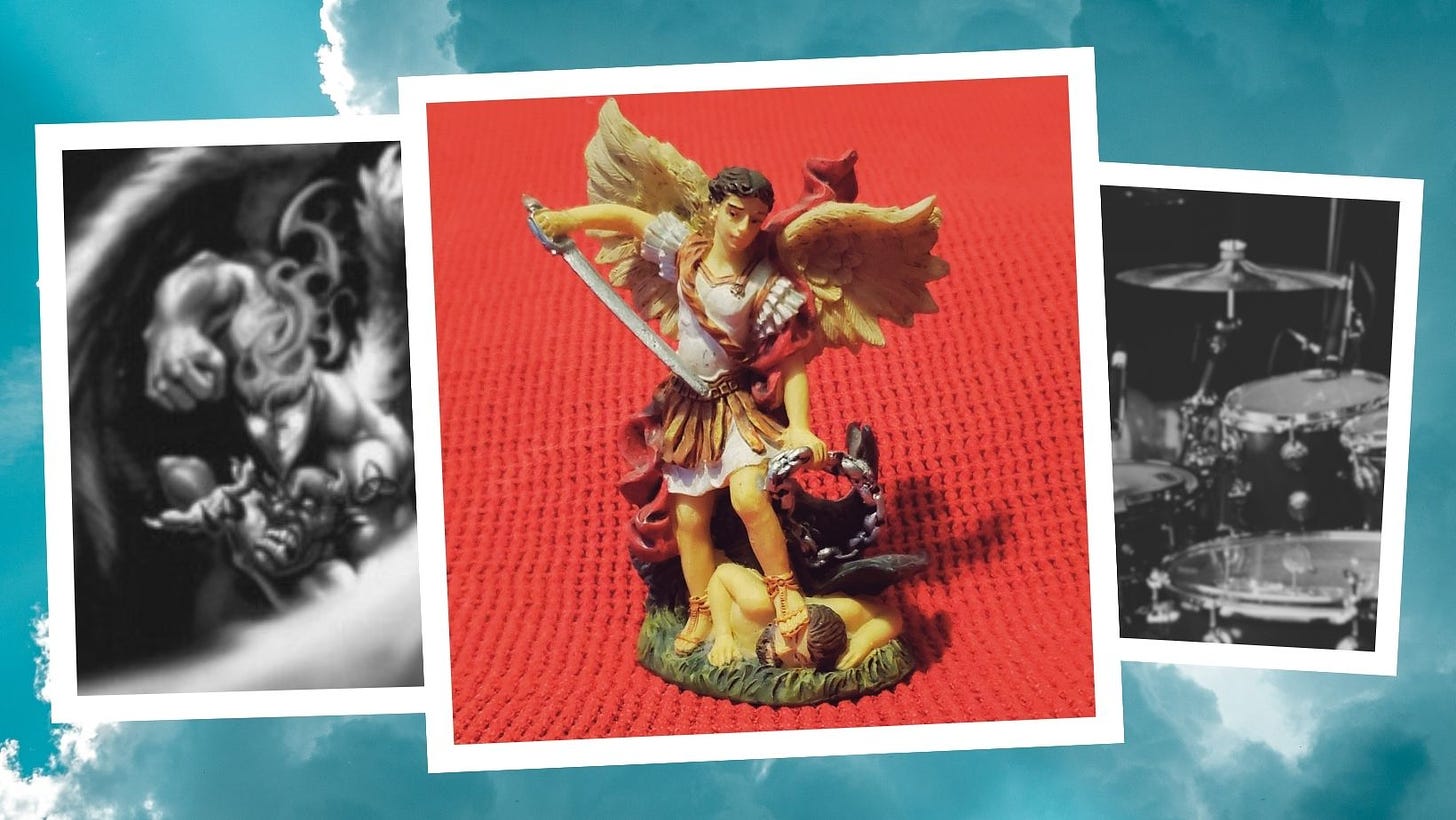The winter of my eighth-grade year, I brought home a great report card, so my musician Dad continued his tradition of rewarding me by taking me out to buy a new album (Compact Disc) of my choosing — albeit, at a Christian bookstore, so my options were limited.
I can’t recall if it was a rainy day or a sunny one. However, I do vividly remember walking into that store at the corner of a local shopping center, wondering what in the world I would buy.
You see, at this point, the spark of my young faith was fizzling out. I was getting bored with church.
I walked to the music section of the store and turned toward the area where they sold more adolescent-friendly artists. Immediately, a poster caught my eye: Four guys dressed in black with dreadlocks, tattoos, and piercings… Was this too good to be true?!
The image pulled me toward the pair of headphones where I could test-drive the album. (How many of you remember those?)
Melodic hard rock mixed with rap lyricism spoke to my idealistic heart, sweeping me away onto a transcendent plane of existence.
Later, kneeling in front of my CD player at home, I poured over the verses and liner notes. Huh. I thought, These guys seem to really, actually believe in Jesus...
That platinum-selling album became my gateway into all things P.O.D. — the name of the band (a clever turn of the financial phrase Payable On Death, alluding to Christ’s crucifixion). Throughout their discography, they called their fans, “Warriors,” to engage in spiritual battle.
Meanwhile, Mom began bringing my sister and I to a Catholic parish chapel for a weekly Holy Hour. To pass the hour of silence, I exercised my teenaged enthusiasm for newfound musical fandom by bringing a Bible to these outings and reading it from cover to cover — not necessarily for spiritual gain, but moreso with the goal of highlighting, circling, and otherwise marking every phrase, verse, or section that had anything to do with Warriors or spiritual combat, such as:
So stand fast with your loins girded in truth, clothed with righteousness as a breastplate, and your feet shod in readiness for the gospel of peace.
—Ephesians 6:14-15
It was a fun game.
Surprise
About two years later, I found myself sitting on the floor of the church banquet hall surrounded by over 100 other high school freshmen. Adults informed us that Confirmation was the sacrament of ‘choosing the Faith for oneself.’ (It’s not, but you can find more on that elsewhere…)
Faced with what I perceived to be a life decision, I questioned whether I actually wanted to be a Catholic. Outside the roundtable discussions of my Confirmation prep sessions, I spent significant personal time pouring over deeper theology on the Internet, from inside and outside the Catholic world.
In the end, my decision to choose Catholicism wasn’t strictly an intellectual one, although that research played an important role. My choice was also informed by the integrity of Catholics who lived their faith, and by my own spiritual experiences.
As I neared the time for Confirmation, the question of a Confirmation name became important. Traditionally, Catholics select a name inspired by saint — someone to emulate through the spiritual journey. Whom would I select?
While my classmates took weeks to ponder it, I required no longer than thirty seconds to answer the question. Already being Angela, I had to choose the Warrior Angel for my Confirmation saint.
When the day came, I handed the bishop my pre-filled notecard with the confirmation name Michelle (Archangel Michael) written on it, but he took that chrism and surprised us all — maybe even himself — by crossing my forehead and saying, “Archangel Michael, be sealed with the Gift of the Holy Spirit.”
As a fairly ‘ungirly’ girl with a hard rocker’s heart, I'm forever grateful to God that's how it happened.
Outgrowing My Armor
High school, university, and married life followed… and I realized that my taste for this patron saint chosen out of youthful zeal had soured a bit. The Internet had complicated the phrase Church Militant, and I had developed an understanding of myself as a bridge-builder rather than a spiritual warrior.
Was I a fraud?
If you’ve perused the Internet enough, you may have noticed that Saint Michael tends to be favored for his muscular build — which, since Michael is a noncorporeal angel, doesn’t exist and none of those three words even apply. The famous depiction of Archangel Michael so widely known is of a winged soldier victoriously pinning down a terrified demon. Even P.O.D. used variations of this imagery for the covers of their album Snuff the Punk.


What often gets overlooked is the actual name Michael, which reveals more than any physical depiction:
מי כאל (mī kāʼēl) 'Who [is] like-El’
The name is a rhetorical question of comparison; there is no one like El, the God of the Hebrews.
Therefore, the name Michael bears implicit humility.
Michael’s Greatness
The first mention of the heavenly person regarded as the Archangel Michael in the Hebrew Scriptures is found when the prophet Daniel receives a revelation about the empire’s end that terrifies him so, he mourns and fasts for three weeks.1 Then a heavenly messenger appears, who comforts him:
“Do not fear, Daniel. From the first day you made up your mind to acquire understanding and humble yourself before God, your prayer was heard. Because of it I started out, but the prince of the kingdom of Persia stood in my way for twenty-one days, until finally Michael, one of the chief princes, came to help me. I left him there with the prince of the kingdom of Persia, and came to make you understand what shall happen to your people in the last days...”2
Later3, Michael is again referenced as a “chief prince” (Hebrew: HaSar HaGadol) and “guardian” of Daniel’s people who "will arise” in a time of unsurpassed distress.
HaGadol is translated as “Great”
HaSar could be translated into a variety of leadership roles such as chief, chieftan, prince, ruler, captain, commander, etc.
All we really know from Daniel is that Michael was a highly regarded and helpful, heavenly leader of some sort.
Michael’s Battles
In the Christian Scriptures, the apostle Jude references an apocryphal story about Michael contending with the devil. He underscores how Michael does not revile the Enemy by any personal strength, but by saying, “May the Lord rebuke you!” — further highlighting Michael’s humility, rooted in God.
In the Book of Revelation, the apostle John’s vision beholds a woman who bears a son destined to rule all nations and “caught up to God and his throne.” The woman flees to a place prepared by God.4
Then war broke out in heaven; Michael and his angels battled against the dragon. The dragon and its angels fought back, but they did not prevail and there was no longer any place for them in heaven. The huge dragon, the ancient serpent, who is called the Devil and Satan, who deceived the whole world, was thrown down to earth, and its angels were thrown down with it.5
This vision has been integrated with Jesus’ words, “I have observed Satan fall like lightning from the sky.”6 Although such a dramatic scene would give Avengers: Endgame a run for its money, the dramatics are not the point, are they?
The point — at least as it relates to Michael — is twofold:
The ancient spiritual enemy did not prevail against Michael and those who fought alongside him.
Perhaps Michael is named here not merely as a leader, but also because of the name Michael. Diverse spiritual traditions and mystics assert that the fundamental interior battle consists in the struggle between conceited pride versus humility. Therefore, Michael — “Who is like God?” could be the battle cry of the humble against the proud.
This ancient enemy and all spiritual beings who sided against God are no longer united with God, and can be found in this mortal realm.
Michael is a chief helper for us in the defense against spiritual enemies.
Spiritual Greatness
Pleading with the Philippians, the apostle Paul wrote:
Do nothing out of selfishness or out of vainglory; rather, humbly regard others as more important than yourselves, each looking out not for his own interests, but everyone for those of others.
Have among yourselves the same attitude that is also yours in Christ Jesus,
Who, though he was in the form of God, did not regard equality with God something to be grasped.
Rather, he emptied himself, taking the form of a slave, coming in human likeness; and found human in appearance, he humbled himself, becoming obedient to death, even death on a cross.
Because of this, God greatly exalted him and bestowed on him the name that is above every name, that at the name of Jesus every knee should bend, of those in heaven and on earth and under the earth, and every tongue confess that Jesus Christ is Lord, to the glory of God the Father.7
Jesus’ glory is not achieved by some sort of forceful conquest, but by the most supreme act of humility.
Today, Saint Michael may be upheld as a symbol for ‘culture warriors’ and raw religious enthusiasm, but a careful examination of Scripture shows us the true Michael: a faithful and trustworthy servant of God whose humility is his strongest quality and whose strength comes entirely from the greatness of a humble God.
In positive terms, the battle against the possessive and dominating self requires vigilance, sobriety of heart. When Jesus insists on vigilance, he always relates it to himself, to his coming on the last day and every day: today. The bridegroom comes in the middle of the night; the light that must not be extinguished is that of faith: "'Come,' my heart says, 'seek his face!'"
— Catechism of the Catholic Church, no. 2730
Dear friend, let us pray:
May our hearts remain humble.
May our zeal be sparked by God’s mercy.
May our imaginations be stoked by grace.
May we not forsake God-fearing for presumption.
May we not confuse compulsion with spiritual discipline,
nor spiritual babble for genuine prayer.
May we not fear or be discouraged; Almighty God is Love,
and there is no one like God.
Holy Archangels, pray for us.
I leave you with one of my old school P.O.D. jams, “Three In the Power of One.”
Peace,
Angela
Book of Daniel, chapter 10
Daniel 10:12-14
Daniel 12:1
Revelation 12:1-6 (New American Bible Revised Edition)
Revelation 12:7-9 (NABRE)
Luke 10:8 (NABRE)
Philippians 2:3-11 (NABRE)




